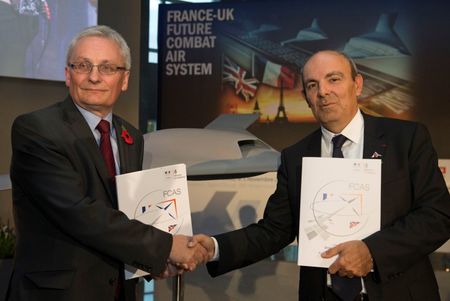By Cyril Altmeyer and Tim Hepher
PARIS (Reuters) - France and Britain took a new step towards developing the unmanned fighter planes of the future by commissioning studies for a combat drone that could be ready for deployment in 2030.
Western Europe's two largest military powers awarded contracts to six companies including France's Dassault Aviation and Britain's BAE Systems for a two-year feasibility study worth 150 million euros (117.14 million pounds), guaranteeing funding for co-operation plans first sketched out earlier this year.
Also involved are UK engine maker Rolls-Royce and its French equivalent Safran as well as electronics groups Thales of France and Selex ES, a partially UK-based subsidiary of Italy's Finmeccanica.
The project comes as advances in unmanned flight fuel debate over how far pilotless planes can take on the role of fighters.
But executives and analysts said it too early to talk about combat drones replacing traditional warplanes altogether.
"We are developing technologies for a future combat drone which could also be used by fighters," said Dassault Aviation Chief Executive Eric Trappier at a Paris signing ceremony.
BAE Systems Chief Executive Ian King added, "It is not manned or unmanned. The two technologies will be used in combination. One does not replace the other."
The companies are expected to share concepts and work together on studies that could, if given further approval, lead to a demonstrator ready by 2017, French officials said.
BAE and Dassault have previously developed their own demonstrators, respectively called Taranis and Neuron, but the costs of such research are seen as formidable.
Together with national measures, the total value of work involved in the study alone will increase to 250 million euros.
"Both Britain and France have the technology and can develop it, but they need each other and haven't got the money to do this alone," said Francis Tusa, editor of Defence Analysis.
Such vehicles could be used for electronic warfare but are unlikely to replace pilots entirely, due partly to legal concerns and the rapid response times of manned jets, he said.
"You still need to have a mix. The rules of engagement mean that in the foreseeable future the idea of autonomous air vehicles is a non-starter."
The new project papers over long-running rivalries by coupling BAE Systems and Rolls-Royce, partners in the Eurofighter jet, with Dassault and Snecma, makers of France's Rafale fighter.
Notably absent, analysts said, is Europe's largest aerospace company, Airbus Group, which has struggled to gain support for major military drone developments in recent years.
"We are in a position which might almost have been described as miraculous a few years ago," said France's arms procurement chief Laurent Collet-Billon. "We have united six huge industrial groups from Britain and France in the same project."
His UK counterpart, Chief of Defence Materiel Bernard Gray, suggested the partners would avoid the over-ambitious military projects that tended to run late and over-budgeted in the past.

"We will take it one step at a time ... We need to understand where technologies take us, where the industrial cooperation takes us. Whatever we do we have to keep it simple".
(Editing by Mark Potter, editing by David Evans)
2_800x533_L_1412520354.jpg)